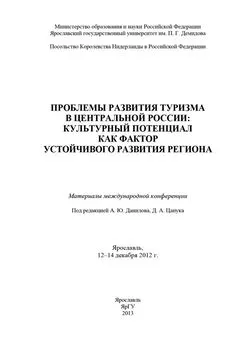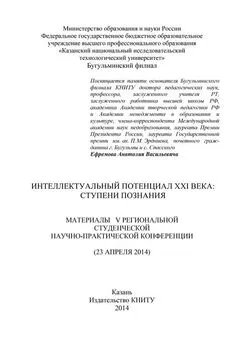Коллектив авторов - Личностный потенциал. Структура и диагностика
- Название:Личностный потенциал. Структура и диагностика
- Автор:
- Жанр:
- Издательство:Смысл
- Год:2011
- Город:Москва
- ISBN:978-5-89357-28
- Рейтинг:
- Избранное:Добавить в избранное
-
Отзывы:
-
Ваша оценка:
Коллектив авторов - Личностный потенциал. Структура и диагностика краткое содержание
Коллективная монография охватывает широкий круг вопросов психологии личности через призму новой концепции личностного потенциала – системы характеристик личности, лежащих в основе успешной саморегуляции в различных сферах жизнедеятельности.
Адресуется психологам.
Личностный потенциал. Структура и диагностика - читать онлайн бесплатно ознакомительный отрывок
Интервал:
Закладка:
Follette V.M., Jacobson N.S. Importance of attributions as a predictor of how people cope with failure // Journal of Personality and Social Psychology. 1987. Vol. 52. P. 1205–1211.
Furnham A., Sadka V., Brewin C.R. The development of an occupational attributional style questionnaire // Journal of Organizational Behavior. 1992. Vol. 13. № 1. P. 27–39.
Garber J. Optimism: Definitions and Origins // The science of optimism and hope: research essays in honor of Martin E.P. Seligman / J.E. Gillham (Ed.). Philadelphia; L.: Templeton foundation press, 2000. P. 299–314.
Gibb B.E., Zhu L., Alloy L.B., Abramson L.Y. Attributional styles and academic achievement in University Students: a longitudinal investigation // Cognitive Therapy and Research. Vol. 26. № 3. 2002. P. 309–315.
Gong-Guy E., Hammen C. Causal perceptions of stressful events in depressed and nondepressed outpatients // Journal of Abnormal Psychology. 1980. Vol. 89. № 5. P. 662–669.
Gordeeva T., Osin E. Optimistic explanatory style and self-efficacy as predictors of happiness and psychological well-being // 1st Applied Positive psychology conference. Abstract booklet. Coventry: University of Warwick, 2007. P. 19.Gordeeva T., Osin E., Ivanchenko G. Optimism, hope, and performance: when optimistic attributional style really helps // 4th European conference on positive psychology. Croatia, July, 2008. Book of abstracts. P. 145.
Hale B . Explanatory style as a predictor of academic and athletic achievement in college athletes // Journal of Sport Behavior. 1993. Vol. 16. P. 63–75.
Hale W.D., Fiedler L.R., Cochran C.D. The revised generalized expectancy for success scale: a validity and reliability study // Journal of Clinical Psychology. 1992. Vol. 48. № 4. P. 517–521.
Hamid P. N. Optimism and the reporting of flu episodes // Social Behaviour and Personality. 1990. Vol. 18. P. 225–234.
Hankin B.L., Abramson L.Y. Measuring cognitive vulnerability to depression in adolescence: Reliability, validity, and gender differences// Journal of Clinical Child and Adolescent psychology. 2002. Vol. 31. P. 491–504.
Hanrahan S.J., Grove J.R., Hattie J. Development of a questionnaire measure of sport– related attributional style // International Journal of Sport Psychology, 1989. Vol. 20. P. 114–134.
Henry P.C. Life stresses, explanatory style, hopelessness, and occupational class // International Journal of Stress Management. 2005. Vol. 12. P. 241–256.
Henry J.W., Martinko M.J., Pierce M.A. Attributional style as a predictor of success in a first computer course // Computers in Human Behavior. 1993. V. 9 (4). P. 341–352.
Herzberg P.Y., Glaesmer H., Hoyer J . Separating optimism and pessimism: a robust psychometric analysis of the revised Life orientation test (LOT-R) // Psychological Assessment. 2006. Vol. 18. № 4. P. 433–438.
Houston D.M. Gloomy but smarter: The academic consequences of attributional style // British Journal of Social Psychology. 1994. Vol. 33. P. 433–441.
Houston D.M., McKee K.J., Wilson J. Attributional style, efficacy, and the enhancement of well-being among housebound older people // Basic and Applied Social Psychology. 2000. Vol. 22(94). P. 309–317.
Johnson J.G., Han Y.-S., Douglas C.J., Johannet C.M., Russell T . Attributions for Positive Life Events Predicts Recovery From Depression Among Psychiatric Inpatients: An Investigation of the Needles and Abramson Model of recovery from Depression // Journal of Counseling and Clinical Psychology. 1998. Vol. 66. № 2. P. 369–376.
Kassinove H., Eckhardt C. Irrational beliefs and self-reported affect in Russia and America // Personality and Individual Differences. 1994. Vol. 16. № 1. P. 133–142.
Kent R., Martinko M. The development and evaluation of a scale to measure organizational attributional style // Attribution theory: and organizational perspective / M. Martinko (Ed.). Delray Beach (FL): St. Lucie Press, 1995. P. 53–75.
LaForge M.C., Cantrell S. Explanatory style and academic performance among college students beginning major course of study // Psychological Reports. 2003. Vol. 92. Issue 3. P. 861.
Leeson P., Ciarrochi J., Heaven P. Cognitive ability, personality, and academic performance in adolescence // Personality and Individual Differences. 2008. Vol. 45. P. 630–635.
МасКinnon-Lewis C., Castellino D.R., Fincham F.D. A Longitudinal examination of the associations between fathers’ and children’s attributions and negative interactions // Social Development. 2001. Vol. 10. № 4. P. 473–487.
Marshall G.N., Wortman C.B., Kusulas J.W., Hervig L.K., Vickers Jr., Ross R . Distinguishing Optimism From Pessimism: Relations to Fundamental Dimension of Mood and Personality // Journal of Personality and Social Psychology. 1992. Vol. 62. P. 1067–1074.
Martin-Krumm С.P., Sarrazin P., Peterson C., Famose J.P. Explanatory style and resilience after sport failure // Personality and Individual Differences. 2003. Vol. 35. P. 1685–1695.
Martinez R., Sewell K.W. Explanatory style as a predictor of college performance in students with physical disabilities // Journal of Rehabilitation. 2000. № 1. P. 30–36.
Mezulis A.H., Abramson L.Y., Hyde J.S., Hankin B.L . Is there a Universal Positivity Bias in Attributions: A meta-analytic review of individual, developmental, and cultural differences in the self-serving attributional bias // Psychological Bulletin. 2004. Vol. 130. № 5. P. 711–747.
Musgrave-Marquart D., Bromley S.P., Dalley M.B. Personality, academic attributions, and substance use as predictors of academic achievement in college students // Journal of Social Behavior and Personality. 1997. Vol. 12. № 2. P. 501–511.
Needles D.J., Abramson L.Y. Positive Life Events, Attributional style, and hopefulness: Testing a model of Recovery from depression // Journal of Abnormal Psychology. 1990. Vol. 99. № 2. P. 156–165.
Nolen-Hoeksema S., Girgus J.S., Seligman M.E.P. Learned helplessness in children: A Longitudinal study of depression, achievement, and explanatory style // Journal of Personality and Social Psychology. 1986. Vol. 51. № 2. P. 435–442.
Nolen-Hoeksema S., Girgus J.S., Seligman M.E. Predictors and consequences of childhood depressive symptoms: A 5-year longitudinal study // Journal of Abnormal Psychology. 1992. Vol. 101. P. 405–422.
Norem J.K., Cantor N. Defensive Pessimism: Harnessing anxiety as motivation // Journal of Personality and Social Psychology. 1986. Vol. 6. P. 1208–1217.
Norman P., Antaki C. The Real Events Attributional Style Questionnaire // Journal of Social and Clinical Psychology. 1988. Vol. 7. P. 97—100.
Oettingen G. Explanatory style in the context of culture // Explanatory style / G.M. Buchanan, M.E.P. Seligman (Eds.). Hillsdale (NJ): Erlbaum, 1995. P. 209–224.
Oettingen G., Little T.D., Lindenberger U., Baltes P.B. Causality, agency, and control beliefs in East versus West Berlin children: A natural experiment on the role of context // Journal of Personality and Social Psychology. 1994. Vol. 66. P. 579–595.
Peterson C. Explanatory style as a risk factor for illness // Cognitive Therapy and Research. 1988. Vol. 12. P. 119–132.
Peterson C. Meaning and measurement of explanatory style // Psychological Inquiry. 1991. Vol. 2. P. 1—10.
Peterson C. The future of optimism // American Psychologist. 2000. Vol. 55. P. 44–54.
Peterson C., Semmel A., von Bayer C., Abramson L., Metalsky G., Seligman M.E.P. The attributional style questionnaire // Cognitive Therapy and Research. 1982. Vol. 6. № 3. P. 287–300.
Peterson C., Barrett L . Explanatory style and academic performance among university freshmen // Journal of Personality and Social Psychology. 1987. Vol. 53 (3). P. 603–607.
Peterson C., Bossio L.M. Optimism and health. N.Y.: Free press, 1991.
Peterson C., Bossio L.M. Optimism and physical well-being // Optimism and pessimism, implications for theory, research, and practice / E.C. Chang (Ed.). Washington (DC): APA, 2000. P. 127–145.
Peterson C., Seligman M.E.P., Vaillant G.E. Pessimistic explanatory style is a risk factor for physical illness: A thirty-five-year longitudinal study // Journal of Personality and Social Psychology. 1988. Vol. 55. P. 23–27.
Peterson C., Seligman M.E.P., Yurko K.H ., Martin L.R., Friedman H.S . Catastrophizing and untimely death // Psychological Science. 1998. Vol. 9. P. 127–130.
Peterson C., Steen T.A. Optimistic explanatory style // Handbook of positive psychology / C.R. Snyder, S.J. Lopez (Eds.). N.Y.: Oxford University press, 2002. P. 244–256.
Poon W.-T., Lau S. Coping with failure: relationship with self-concept discrepancy and attributional style // Journal of Social Psychology. 1999. Vol. 139 (5). P. 639–653.
Proudfoot J., Corr P.J., Guest D.E., Gray J.A. The development and evaluation of a scale to measure occupational attributional style in the financial service sector // Personality and Individual Differences. 2001. Vol. 30. P. 259–270.
Rettew D.C., Reivich K. Sports and explanatory style // Explanatory style / G.M. Buchanan, M.E.P. Seligman (Eds.). Hillsdale (NJ): Erlbaum, 1995. P. 173–185.
Robbins A.S., Spence J.T., Clark H. Psychological Determinants of Health and Performance: The Tangled Web of Desirable and Undesirable Characteristics // Journal of Personality and Social Psychology. 1991. Vol. 61. P. 755–765.
Rowe J.E., Lockhart L.K. Relationship of Cognitive Attributional style and academic performance among a predominantly Hispanic college student population // Individual Differences Research. 2005. Vol. 3 (2). P. 136–139.
Rueger S.Y., Malecki C.K . Group Administration of the Children’s Attributional style interview // Journal of Clinical Child and Adolescent Psychology. 2007. Vol. 36. № 3. P. 476–482.
Ryan R.M., Little T.D., Sheldon K.M., Timoshina E., Deci E.L. The American Dream in Russia: Extrinsic Aspirations and Well-Being in Two Cultures // Personality and Social Psychology Bulletin. 1999. Vol. 25. № 12. P. 1509–1524.
Salama-Younes M., Martin-Krumm C., Hanrahan S., Roncin C. Children’s explanatory style in France: Psychometric properties of the children’s attributional style questionnaire and reliability of a shorter version // Handbook of Positive Psychology / A. Delle Fave, M.E.P. Seligman (Eds.). – N.Y.: Oxford University Press, 2006. P. 191–206.
Satterfield J. M., Monahan J., Seligman M.E.P. Law school performance predicted by explanatory style // Behavioral Sciences and the Law. 1997. Vol. 15. P. 95—105.
Scheier M. F., Carver C. S. Optimism, coping, and health: Assessment and implications of generalized outcome expectancies // Health Psychology. 1985. Vol. 4. P. 219–247.
Scheier M. F., Carver C. S . Dispositional optimism and physical well-being: the influence of generalized outcome expectancies on health // Journal of Personality. 1987. Vol. 55. P. 169–210.
Scheier M. F., Carver C. S. A model of behavioral self-regulation: translating intentions into actions // Advances in experimental social psychology Vol. 21 / L. Berkowitz (Ed.). N.Y.: Academic Press, 1988. P. 303–346.
Scheier M. F., Carver C. S. Effects of optimism on psychological and physical well-being: Theoretical overview and empirical update // Cognitive Therapy and Research. 1992. Vol. 16. P. 201–228.
Читать дальшеИнтервал:
Закладка:










